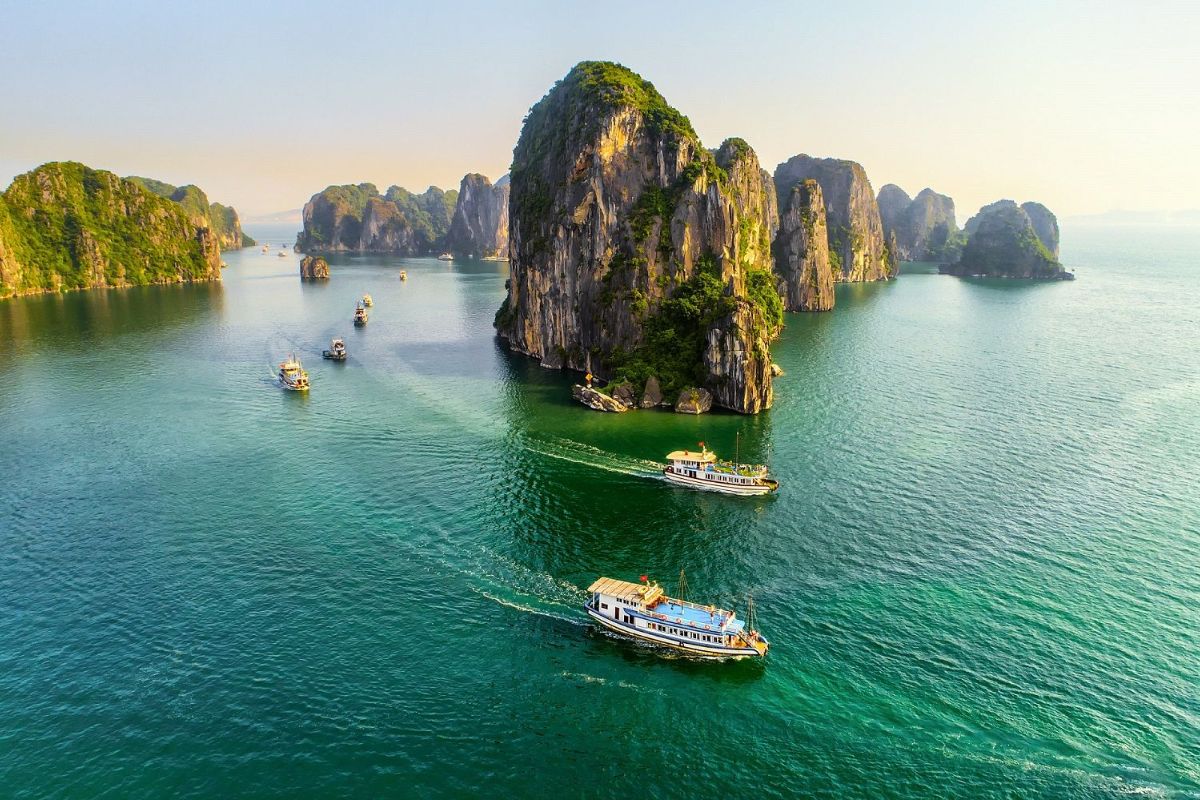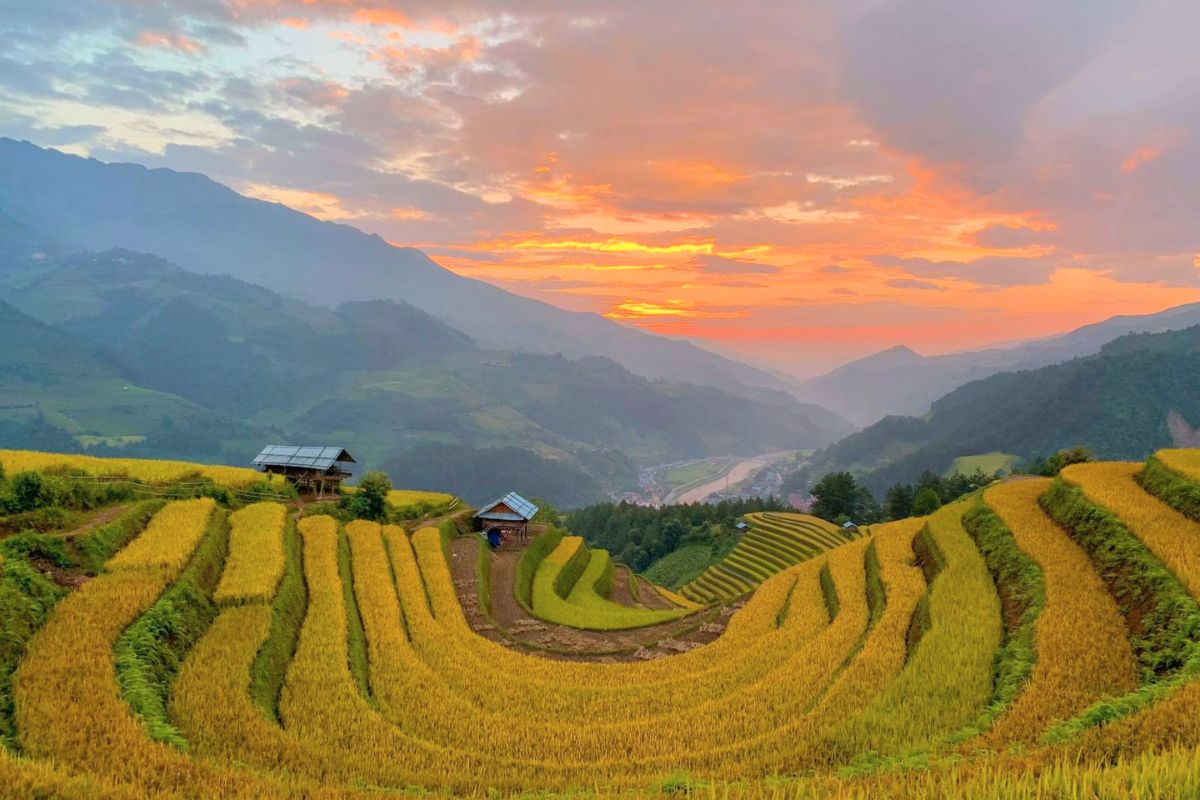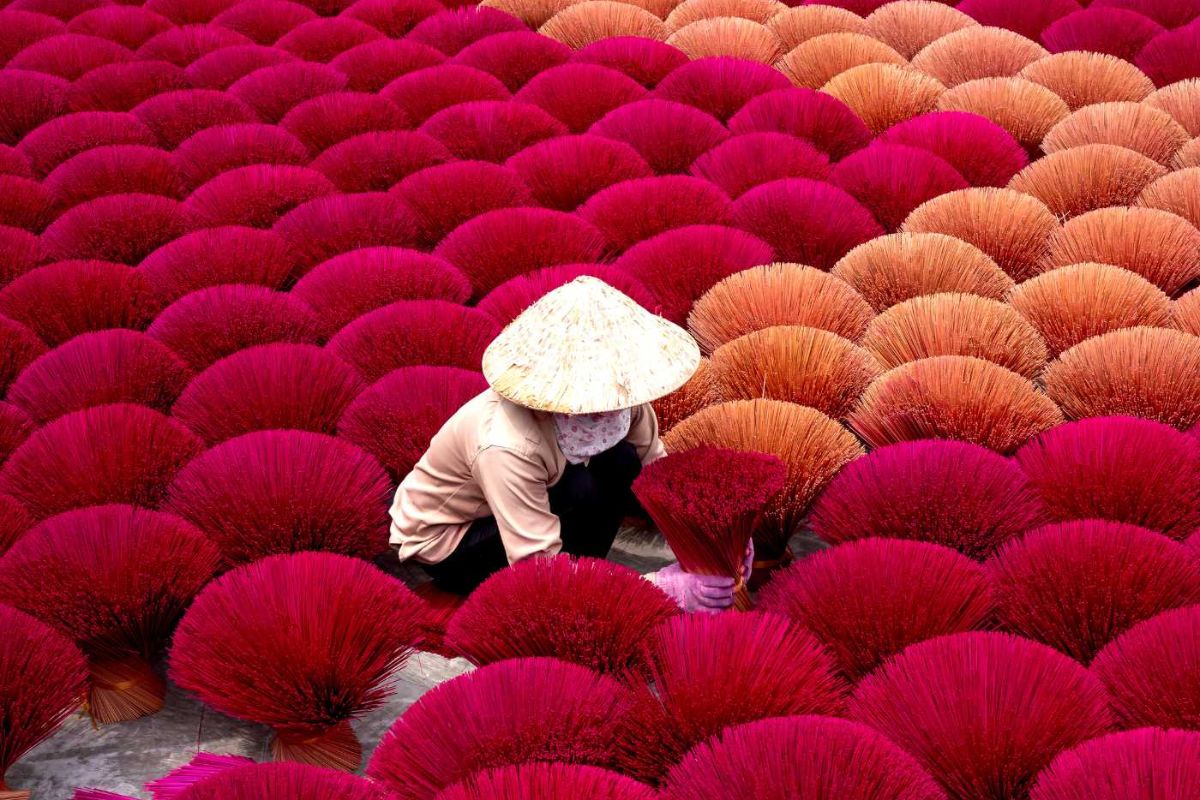TABLE OF CONTENT
Halong Bay has always been one of Vietnam’s most iconic destinations. Its stunning karst limestone mountains, emerald waters, and hidden caves make it a UNESCO World Heritage Site, drawing visitors from all over the world. However, like any travel destination, timing is key. The best time to visit Halong Bay can make or break your experience. This guide will guide you through the ideal seasons for your trip, ensuring you get the most out of Halong Bay.

Overview of Halong Bay’s weather
Halong Bay has a tropical monsoon climate with distinct seasons because of its location in northern Vietnam. The four main seasons of Halong Bay weather – spring, summer, fall, and winter – each bring their own unique atmosphere to visitors.
- Spring (March to May): Halong Bay is often visited during this mild and lovely season. Temperatures are pleasant but not too hot, with occasional showers and low humidity.
- Summer (June to August): Summer is the rainy season, marked by high temperatures and high humidity. Plans may be disrupted by storms, but there are still some nice days.
- Autumn (September to November): With clear skies, low humidity, and milder temperatures, autumn is often considered the ideal season to explore Halong Bay. This is the perfect time of year for a variety of activities.
- Winter (December to February): Winter in Halong Bay is cool, especially in the evenings and early mornings. Fog occurs due to the cold weather and can either enhance or detract from the serene beauty of the bay.
Best time to visit Halong Bay by season
Spring (March to May)
Spring is the most enjoyable time to visit Halong Bay. The daily highs and lows are in the comfortable warm range of 18°C to 25°C (64°F to 77°F). Clear skies and mild winds make for ideal outdoor activities such as hiking, kayaking, and boating.
There are a number of festivals in the surrounding towns in the spring for those interested in cultural activities. This is also a great time for photography, as the natural beauty of the bay can be captured beautifully on sunny days.
However, keep in mind that springtime in Vietnam is the busiest time of year for foreign tourists. It’s critical to plan if you want to get the best rates on accommodations and cruises.
Summer (June to August)
In Halong Bay, summer can have its downsides. On the one hand, the sunny days of this season are ideal for water sports such as swimming and diving. However, summer is also the rainy season, and typhoons and tropical storms can occur, especially in July and August. These storms can cause cruise cancellations or changes in plans, so it’s essential to check weather forecasts and have a flexible itinerary.
Despite the risk of rain, summer remains a popular time for local tourists, especially during school holidays. The bay becomes lively, and families and groups of friends enjoy the beaches and water sports. If you prefer a quieter experience, consider visiting during the weekdays rather than weekends.

If you’re an adventurous traveler, summer could still be the best time to go to Halong Bay. There are plenty of sunny days, and the lush green landscape looks particularly stunning after the rains.
Autumn (September to November)
For many, autumn is the absolute best time to visit Halong Bay. The weather is perfect—cooler than summer but still warm enough for outdoor activities. Temperatures range between 20°C to 27°C (68°F to 81°F), and there’s little rainfall compared to other seasons. This is the best time of year to go cruising, kayaking, and cave exploring as the rivers are calm and the skies are often clear.
In addition to being less crowded than spring, autumn also offers a quieter and more tranquil atmosphere. This time of year offers particularly beautiful sunsets, bathing the limestone cliffs in the bay in a golden glow.
However, autumn can still bring a few storms, so visitors should check the weather forecast before visiting Halong Bay.

Winter (December to February)
Winter is the low season for domestic visitors to Halong Bay, but there are still plenty of international visitors. As the temperatures drop, the bay takes on a quiet, almost mystical beauty. Daytime temperatures can range from 12°C to 20°C (54°F to 68°F), with cooler nights. The frequent fog in the mornings can either make the scenery seem more mysterious or restrict your visibility.
Winter is the best time to visit Halong Bay if you want peace and quiet, but it may not be the best time for those looking for a tropical experience. There are fewer tourists, so the cost of cruises and hotels is lower. Just be aware that if you plan to travel at this time of year, pack warmer clothes.
Peak tourist seasons and off-peak seasons
Peak Seasons
- Summer (June to August)
- December to February (especially around Christmas, New Year, and Tet)
You should make reservations for lodging and tours well in advance of these periods due to the increased number of tourists and higher prices. Peak seasons, however, also provide the ideal weather for several activities as well as a lively atmosphere.
Off-Peak Seasons:
- Spring (March to May, excluding public holidays)
- Autumn (September to November)
These times of year often offer the ideal combination of pleasant weather and fewer crowds. You can find more affordable options for accommodation and cruises, as well as a more relaxed atmosphere. For a more authentic experience, many believe that visiting Halong Bay in the off-season is the best option.
Best time to go to Halong Bay for specific activities
Cruising and kayaking
Spring and autumn are the best time to visit Halong Bay for kayaking and cruising. These seasons are ideal for kayaking and exploring the bay’s secret lagoons and caves as the waters are calm and the skies are clear. Whether you go on an overnight cruise or a day trip, the pleasant weather ensures a great holiday.

Swimming and beach activities
The summer months are the best time to go to Halong Bay if you want to spend time swimming, snorkeling, or at the beach. This is the ideal time to swim in the emerald waters of the bay or relax on the sandy beaches of places like Ti Top Island as the weather is pleasant and the days are long. Just be aware that this is the rainy season and keep an eye out for any storm warnings on the weather forecast.
Hiking and cave exploration
Autumn is the best time to visit Halong Bay for hiking and caving. Hiking to panoramic viewpoints and exploring famous caves of Halong Bay, such as Hang Sung Sot (Surprise Cave) and Hang Thien Cung (Heavenly Palace Cave), is possible thanks to the cool temperatures and dry weather. This is the time of year when, for example, the view from the top of Bai Tho Mountain is spectacular.

Photography
Photographers will find that spring and autumn offer the best lighting conditions for capturing Halong Bay’s beauty. The bright, clear skies of spring and the golden sunsets of autumn create ideal backdrops for landscape shots. Whether you’re photographing the bay’s iconic limestone pillars or the local fishing villages, these seasons provide the most picturesque scenes.
Explore Halong Bay and many other heritages of Vietnam with Asia Encounter tour:
In summary, the best time to visit Halong Bay depends on what you’re looking for in your trip. Spring and autumn offer the most favorable weather, perfect for cruising, kayaking, and sightseeing. Summer is great for beach lovers and water activities, while winter provides a peaceful, off-the-beaten-path experience for those who don’t mind the cooler temperatures.
—
For more information on planning your perfect Halong Bay getaway, including tailored tour packages and expert local insights, visit Asia Encounter. Our team of Vietnam travel specialists can help you craft an itinerary that aligns with the best time to travel to Halong Bay for your unique interests and preferences.




